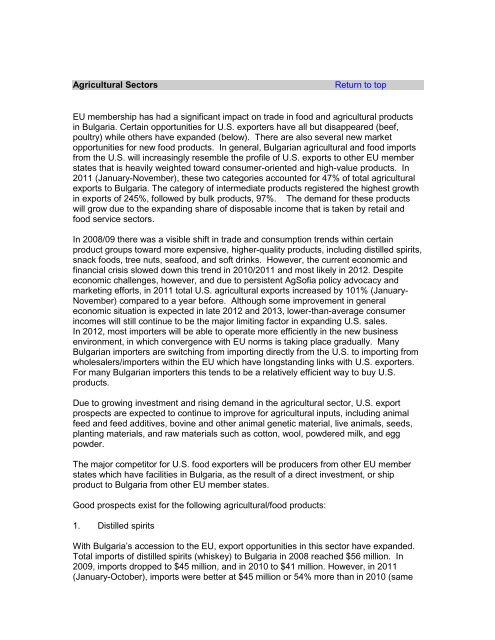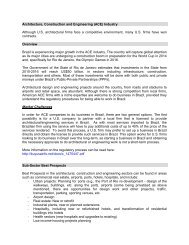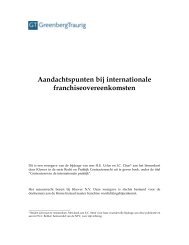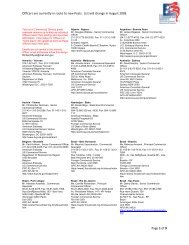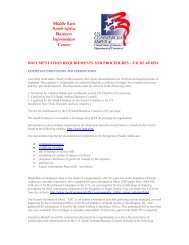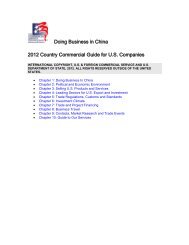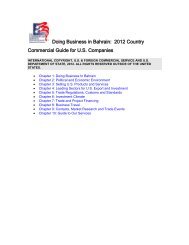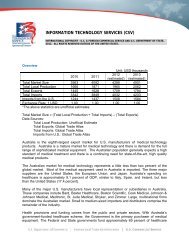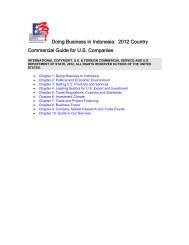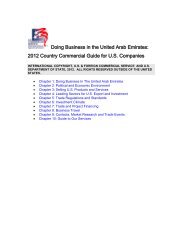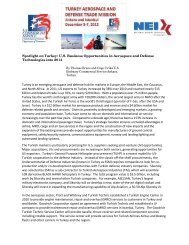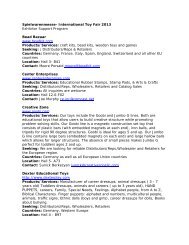Bulgaria Country Commercial Guide 2012 - Export.gov
Bulgaria Country Commercial Guide 2012 - Export.gov
Bulgaria Country Commercial Guide 2012 - Export.gov
You also want an ePaper? Increase the reach of your titles
YUMPU automatically turns print PDFs into web optimized ePapers that Google loves.
Agricultural Sectors Return to top<br />
EU membership has had a significant impact on trade in food and agricultural products<br />
in <strong>Bulgaria</strong>. Certain opportunities for U.S. exporters have all but disappeared (beef,<br />
poultry) while others have expanded (below). There are also several new market<br />
opportunities for new food products. In general, <strong>Bulgaria</strong>n agricultural and food imports<br />
from the U.S. will increasingly resemble the profile of U.S. exports to other EU member<br />
states that is heavily weighted toward consumer-oriented and high-value products. In<br />
2011 (January-November), these two categories accounted for 47% of total agricultural<br />
exports to <strong>Bulgaria</strong>. The category of intermediate products registered the highest growth<br />
in exports of 245%, followed by bulk products, 97%. The demand for these products<br />
will grow due to the expanding share of disposable income that is taken by retail and<br />
food service sectors.<br />
In 2008/09 there was a visible shift in trade and consumption trends within certain<br />
product groups toward more expensive, higher-quality products, including distilled spirits,<br />
snack foods, tree nuts, seafood, and soft drinks. However, the current economic and<br />
financial crisis slowed down this trend in 2010/2011 and most likely in <strong>2012</strong>. Despite<br />
economic challenges, however, and due to persistent AgSofia policy advocacy and<br />
marketing efforts, in 2011 total U.S. agricultural exports increased by 101% (January-<br />
November) compared to a year before. Although some improvement in general<br />
economic situation is expected in late <strong>2012</strong> and 2013, lower-than-average consumer<br />
incomes will still continue to be the major limiting factor in expanding U.S. sales.<br />
In <strong>2012</strong>, most importers will be able to operate more efficiently in the new business<br />
environment, in which convergence with EU norms is taking place gradually. Many<br />
<strong>Bulgaria</strong>n importers are switching from importing directly from the U.S. to importing from<br />
wholesalers/importers within the EU which have longstanding links with U.S. exporters.<br />
For many <strong>Bulgaria</strong>n importers this tends to be a relatively efficient way to buy U.S.<br />
products.<br />
Due to growing investment and rising demand in the agricultural sector, U.S. export<br />
prospects are expected to continue to improve for agricultural inputs, including animal<br />
feed and feed additives, bovine and other animal genetic material, live animals, seeds,<br />
planting materials, and raw materials such as cotton, wool, powdered milk, and egg<br />
powder.<br />
The major competitor for U.S. food exporters will be producers from other EU member<br />
states which have facilities in <strong>Bulgaria</strong>, as the result of a direct investment, or ship<br />
product to <strong>Bulgaria</strong> from other EU member states.<br />
Good prospects exist for the following agricultural/food products:<br />
1. Distilled spirits<br />
With <strong>Bulgaria</strong>’s accession to the EU, export opportunities in this sector have expanded.<br />
Total imports of distilled spirits (whiskey) to <strong>Bulgaria</strong> in 2008 reached $56 million. In<br />
2009, imports dropped to $45 million, and in 2010 to $41 million. However, in 2011<br />
(January-October), imports were better at $45 million or 54% more than in 2010 (same


